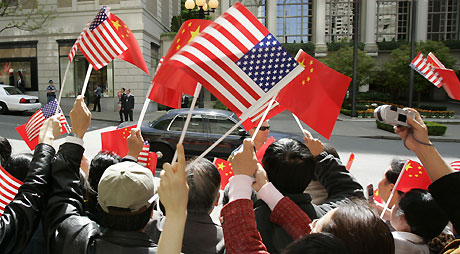SEATTLE: President Hu Jintao's arrival in Sseatle, the first visit by the head of
state of a major country in recent years, is generating a lot of buzz among the
media, businesses and the Chinese community.
More than 340 journalists from different media organizations worldwide have
applied for press passes to cover Hu's visit.

Members of the official welcoming
committee wave flags as the motorcade bringing Chinese President Hu Jintao
arrives at his hotel in Seattle April 18, 2006. [Reuters] |
|
|
|
Although Sino-US talks over major issues will be held in Washington DC, there
is still much to report from the local perspective, William B. Stafford,
president of the Trade Development Alliance of Greater Seattle, told China
Daily.
The alliance estimates that two-way trade between China and Washington state
home to Boeing, Microsoft and Starbucks totalled more than US$20 billion two
years ago.
China has been the third-largest trading partner of the state since 1995,
behind Japan and Canada.
Boeing Company, where Hu visits this morning, signed a major deal on April 11
with a large trade mission headed by Vice-Premier Wu Yi, under which China is to
buy 80 passenger jets.
Craig Mundie, Microsoft's chief technical officer in Advanced Strategies
& Policy, forecast that China's economy would grow dramatically in the years
ahead.
"As China grows stronger, we expect it to be an incremental market
opportunity," Mundie told China Daily on Monday at Microsoft Corp headquarters
in Redmond.
"We think China is the place where we can find a great deal of talents,"
Mundie said. Microsoft China's research and development centre employs about
3,000 programmers, engineers and technicians.
He said Microsoft realizes that there are special requirements in adapting
technology to local needs. "So part of the work we do there is adaptation or
localization in language, or culture or law to deal with the Chinese
environment," he said.
According to the trade aliance, Starbucks plans to open
several hundred outlets throughout China, to add to the 196 in Beijing, Hong
Kong, Macao and other major cities.